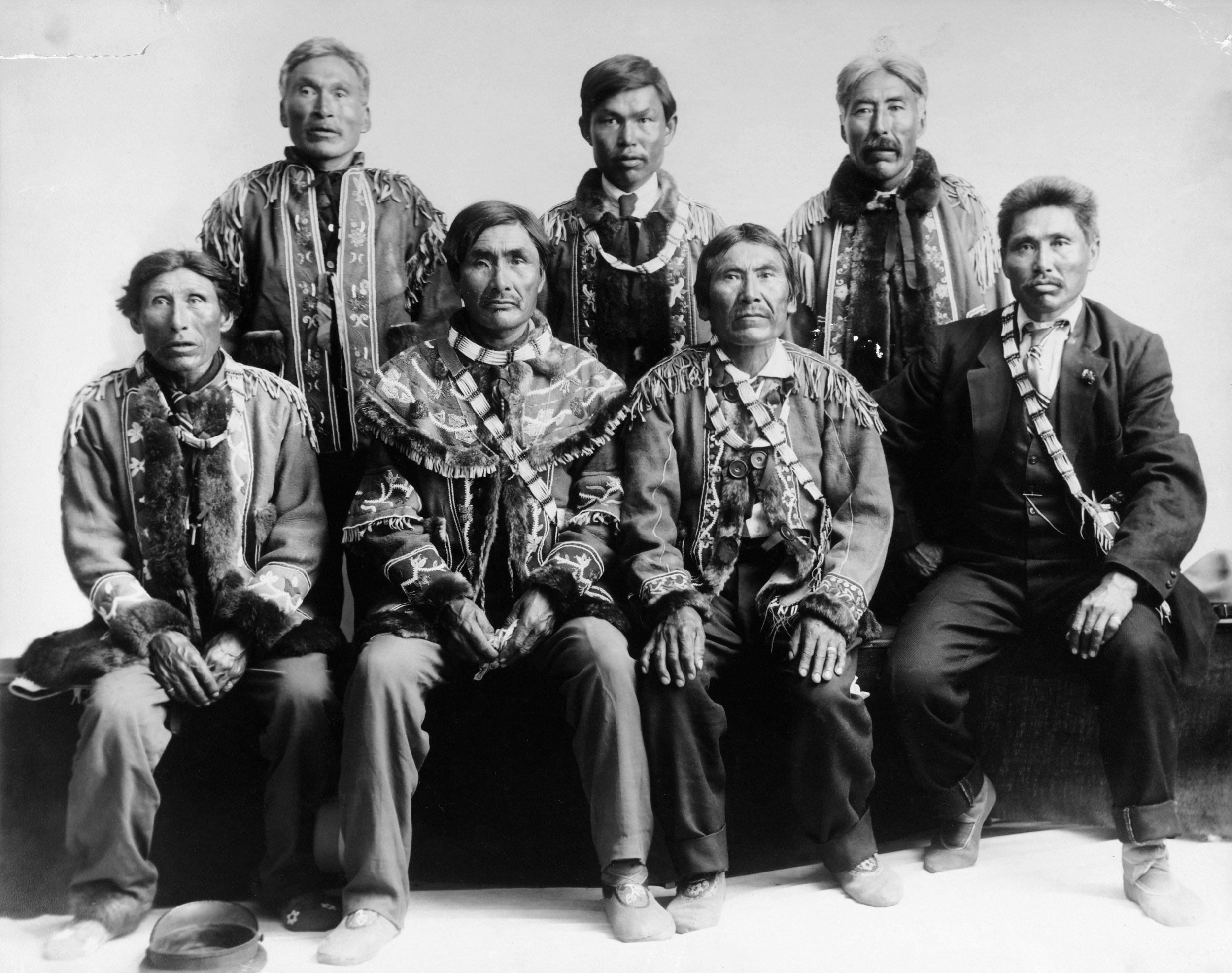Tanana Chiefs, Fairbanks, Alaska, July 1915. Left to right: Chief Alexander of Tolovana, Chief Thomas of Nenana, Chief Evan of Koschakat, Chief Alexander William of Tanana. Left to right standing: Chief William of Tanana, Paul Williams Tanana, and Chief Charlie of Minto. Albert Johnson Photograph Collection, Alaska and Polar Regions Collections and Archives, University of Alaska Fairbanks, UAF-1989-166-133.
AHS & CIHS Present: The Alaska Historical Society Lecture and Discussion Series
Where: In person at the Anchorage Museum Auditorium or free online via Crowdcast.
Free and open to the public. Please use the museum’s 7th Avenue entrance.
Advance registration is required to receive the link. Please register directly on the Anchorage Museum website by following this link: Register Here.
Panelists: Alex Cleghorn, David S. Case & Rosita Kaaháni Worl
Moderator: William Schneider
This is the first of a four-part lecture and panel series about major public policy issues facing Alaska. The sessions, scheduled at the Anchorage Museum, are designed to combat the often willful distortion of history and create a more productive environment in which to arrive at sound public policy.
The first program, entitled “Alaska Native Sovereignty,” will consider the history of the relationship between Native groups and the federal government. The landmark 1971 Alaska Native Claims Settlement Act was broadly seen as the settlement of longstanding Alaska Native land claims. Some contend the act greatly limits Native sovereignty, while others point to Native assertion of sovereignty in self-government and active management of vital services such as health care delivery.
The first program will feature three experts on Alaska Native sovereignty: Alex Cleghorn, David S. Case, and Rosita Kaaháni Worl. The moderator is William Schneider, oral historian, anthropologist, and professor emeritus at the University of Alaska Fairbanks.
The panel will discuss the topic at hand and take questions from both a live and on-line audience. Alaska students will be encouraged to participate.
To help raise the level of civil discourse across Alaska, the Alaska Historical Society (AHS) launched this four-part lecture and panel discussion series. “Today in Alaska, as in much of the rest of the country, our civic discourse has deteriorated to a point where sensible public policy is not only enormously challenging, but often unachievable,” said William Schneider, University of Alaska Fairbanks professor emeritus and recent past president of the Alaska Historical Society. “By demonstrating how knowledge of history can inform and improve current public policy debate, we hope to raise the level of discussion so an informed public can encourage decision-makers to draw on history to make fact-based policy which serves the broadest diversity of Alaskans,” Schneider said.
The AHS is Alaska’s largest statewide organization dedicated to the informed exchange of ideas through a factual appreciation of Alaska’s history. It is partnering with the Cook Inlet Historical Society and the Anchorage Museum on the series. The Atwood Foundation has provided a generous grant to cover costs. Other supporting organizations include the League of Women Voters, the University of Alaska Anchorage Seawolf Debate Program and OLE!, an Anchorage-based nonprofit which offers educational classes.
Subsequent sessions will address: Americanization of Alaska; Conservation and Development; and Weather Events and Climate Change.
ABOUT THE PANELISTS
David Case is a legal scholar, attorney, and author. He has over thirty years of practice representing Alaska Native tribal, corporate, and municipal legal interests. Case’s book, written with David A. Voluck, Alaska Natives and American Laws, was originally published in 1978 and is now in its third edition. It is cited and quoted by scholars and the courts, including the U.S. Supreme Court.
Alex Cleghorn is an attorney and is chief operating officer of the Alaska Native Justice Center. Cleghorn, of Sugpiaq descent and a tribal citizen of Tangirnaq Native Village, previously served as assistant attorney general and special assistant to the Alaska Attorney General, where he led and coordinated efforts to build collaborative relationships between the state and Alaska tribes.
Rosita Kaaháni Worl is a Tlingit scholar and anthropologist. Worl, president of the Sealaska Heritage Institute, has conducted research throughout Alaska and the circumpolar Arctic. Her current research contributions have focused on the role of Native corporations and the issues surrounding cultural inclusion and ways Native corporations represent cultural values.

